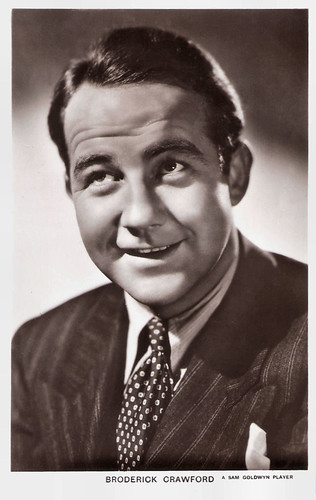
British postcard in the Picturegoer Series, London, no. 1399. Photo: Sam Goldwyn.
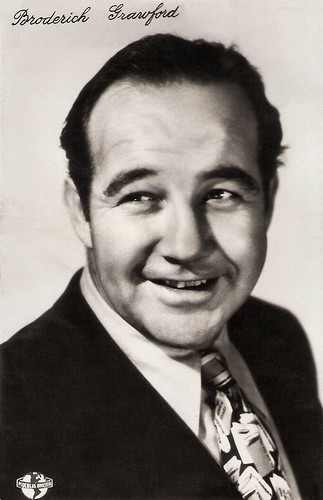
Spanish postcard. Photo: Universal.
Stereotyped as a fast-talking tough guy
William Broderick Crawford was born in Philadelphia, Pennsylvania, in 1911. His parents were Lester Crawford and Helen Broderick, who were both vaudeville performers, as his grandparents had been. Lester Crawford appeared in films in the 1920s and 1930s, and his mother had a minor career in Hollywood comedies, including a memorable appearance as Madge in the classic musical Top Hat (Mark Sandrich, 1935).
Young William joined his parents on stage, working for producer Max Gordon. After graduating from high school, Crawford was accepted by Harvard College where he enrolled. However, after only three weeks at Harvard, he dropped out to work as a dockworker on the New York docks.
Crawford returned to vaudeville and radio, which included a period with the Marx Brothers on the radio comedy show Flywheel, Shyster, and Flywheel (1932-1933). He played his first serious character as a footballer in 'She Loves Me Not' at the Adelphi Theatre, London in 1932.
Early in his career, Crawford was stereotyped as a fast-talking tough guy and often played villainous parts. He realised he did not fit the role of a handsome leading man, once describing himself as looking like a 'retired pugilist'. In 1937, he gained fame as Lennie in John Steinbeck’s 'Of Mice and Men' on Broadway. Crawford moved to Hollywood, and made his film debut in the comedy Woman Chases Man (John G. Blystone, 1937), in a supporting role to stars Joel McCrea and Miriam Hopkins.
Crawford did not play Lennie in the film version of Of Mice and Men (Lewis Milestone, 1939). Lon Chaney Jr. starred in the film version as Lenny. However, Crawford was selected for a supporting role in the successful action/adventure film Beau Geste (William A. Wellman, 1939). He followed this up with another important supporting role as a big but kind-hearted lug in the gangster spoof Larceny, Inc. (Lloyd Bacon, 1942) with Edward G. Robinson.
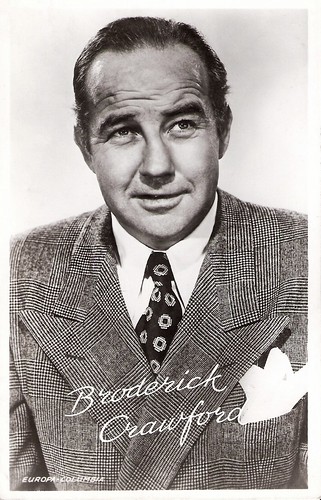
Dutch postcard by Takken / 'T Sticht, Utrecht, no. 3327. Photo: Europa-Columbia.
The pinnacle of his acting career
During World War II, Broderick Crawford enlisted in the United States Army Air Corps. Assigned to the Armed Forces Network, he was sent to Britain in 1944 as a sergeant, he served as an announcer for the Glenn Miller American Band. After the war, his career was first largely limited to B films in supporting or character roles. Nevertheless, he excelled in his role as a villain.
In 1949, he reached the pinnacle of his acting career when he was cast in the Film Noir All the King's Men (Robert Rossen, 1949), based on the Pulitzer Prize-winning novel by Robert Penn Warren. He played the ambitious and sometimes ruthless politician Willie Stark, a character inspired by Louisiana politician Huey Long. The film was a huge hit, and Crawford's performance as the bullying, blustering, yet insecure Governor Stark won him the Academy Award for Best Actor.
The following year, the actor would star in another hit 'A'-list production, the comedy-drama Born Yesterday (George Cukor, 1950) with William Holden. He was memorable as Judy Holliday's boisterous boyfriend.
His Academy Award and larger-than-life persona won him more diverse roles, and he appeared in such varied films as Scandal Sheet (Phil Karlson, 1952), Fritz Lang's Human Desire (1954) and Between Heaven and Hell (Richard Fleischer, 1956).
In 1955, Crawford assumed the starring role of Rollo Lamar, the most violent of convicts in Big House, U.S.A. (Howard W. Koch, 1955). In the film, Crawford's character is a hardened convict so violent he commands the obedience of even the most violent and psychotic prisoners in the prison yard, including those portrayed by such famous tough-guy actors as Charles Bronson, Ralph Meeker, and Lon Chaney, Jr.
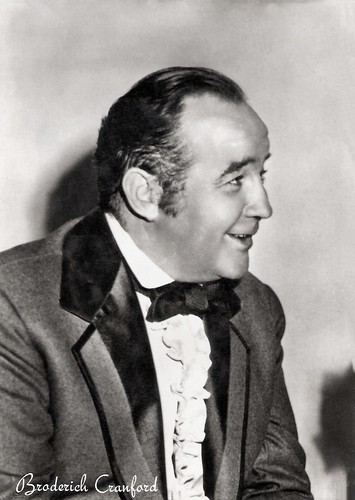
Italian postcard by Rotalfoto, Milano, no. 8.
A hard-as-nails police official
Broderick Crawford also worked in Europe. He starred opposite Richard Basehart and Giulietta Masina in Federico Fellini's comedy Il bidone/The Swindle (1955). The film follows the exploits of a group of swindlers, focusing on their aging leader Augusto (Crawford), as they go about their ‘business,’ reaping both rewards and consequences.
He appeared also in Stanley Kramer's melodrama Not as a Stranger (1955) with Olivia de Havilland, Robert Mitchum and Frank Sinatra. He was rather improbable as a fast-draw outlaw opposite Glenn Ford in the Western The Fastest Gun Alive (Russell Rouse, 1956).
In 1955, television producer Frederick Ziv of ZIV Television Productions offered Crawford the lead role as Dan Mathews in the police drama Highway Patrol (1955–1959), which dramatized the law enforcement activities of the California Highway Patrol. ZIV operated on an extremely low budget of $25,000 per episode but Crawford would receive ten percent of the gross receipts per his contract.
While the show's scripts were largely fictional, the use of realistic dialogue and Crawford's convincing portrayal of a hard-as-nails police official helped make the show an instant success. Highway Patrol helped revive Crawford's career and cement his 'tough guy' persona, which he used successfully in numerous film and TV roles for the rest of his life.
Fed up with the show's hectic shooting schedule, Crawford quit Highway Patrol at the end of 1959 to make a film in Europe and try to get his drinking under control. He appeared as the villain in the Italian-French Peplum (Sword and sandal film) La vendetta di Ercole/Goliath and the Dragon (Vitoria Cottafavi, 1960) with bodybuilder Mark Forest as Hercules/Goliath. Later Crawford also appeared in the Spanish Peplum El Valle de las espadas/The Castilian (Javier Setó, 1963) with Frankie Avalon.
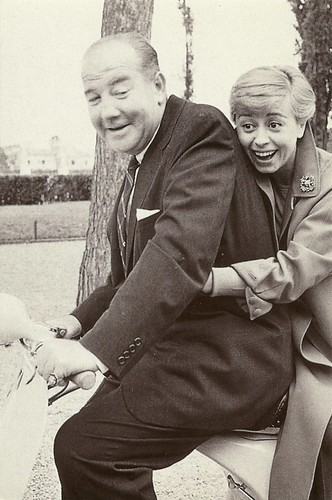
Italian postcard by Ed Graphicarta, Pontedera for Piaggio in the series Kit Postcards Vespa. Giuliette Masina and Crawford played together in Il bidone (Federico Fellini, 1955).
Bouts of heavy alcohol consumption and large meals
Broderick Crawford's successful run as Dan Mathews in Highway Patrol (1955–1959) earned him some two million dollars under his contract with ZIV. Back from Europe, and having temporarily stopped drinking, Crawford signed to star in King of Diamonds (1961-1962) as diamond industry security chief John King. In 1962, after the end of the series, Crawford returned to acting in European-made films. Between 1962 and 1970, Crawford appeared in no less than seventeen additional films, though many of them failed to generate much box office success.
After 1970, Crawford again returned to television. He played the role of Dr. Peter Goldstone in The Interns (Marvin J. Chomsky a.o., 1970-1971). In 1977, he starred as FBI director J. Edgar Hoover in the TV movie The Private Files of J. Edgar Hoover (Larry Cohen, 1977). He would eventually make a series of guest appearances in several made-for-TV movies.
Crawford worked in 140 motion pictures and television series during his career and remained an especially durable presence in television. One of his last roles was as a film producer who is murdered in a 1982 episode of the TV detective series Simon & Simon (Burt Kennedy a.o., 1981-1989). The actor who played the part of the suspected murderer was Stuart Whitman, who had played the recurring part of Sergeant Walters on Highway Patrol.
His final feature film was the Austrian-American production Den Tüchtigen gehört die Welt/The Uppercrust (Peter Patzak, 1982). Throughout his adult life, Crawford was prone to bouts of heavy alcohol consumption and was known for eating large meals. These habits contributed to a serious weight gain for Crawford during the 1950s. During the filming of Highway Patrol, Crawford's heavy drinking increased. It resulted in several arrests and stops for driving under the influence of alcohol (DUI), which eventually gained him a suspended driving license.
Broderick Crawford died following a series of strokes in 1986 at the age of 74 in Rancho Mirage, California. He had been married three times, to actress Kay Griffith (1940–1958; divorced); to Joan Tabor (1962–1967; divorced) and to Mary Alice Moore (1973–1986; his death). He had two sons, Christopher Broderick Crawford (1947-2002) and Kelly Griffith Crawford (1951–2012) from his marriage to Kay Griffith.
Trailer All the King's Men (1949). Source: eddies Movies77 (YouTube).
Italian trailer for Il bidone/The Swindle (1955). Source: chatnel numéro 5 (YouTube).
Trailer for La vendetta di Ercole/Goliath and the Dragon (1960). Source: BestDomainVidz (YouTube).
Sources: Jon C. Hopwood (IMDb), Wikipedia, and IMDb.
This post was last updated on 7 November 2023.
No comments:
Post a Comment